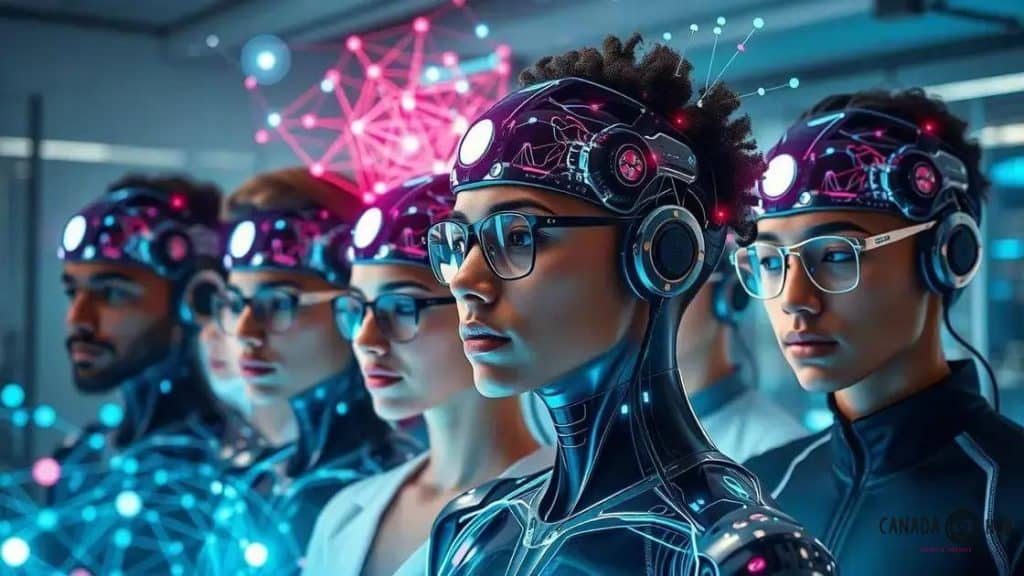Neurological enhancement technologies using AI-driven tools

Neurological enhancement technologies using AI-driven tools offer personalized solutions to improve cognitive abilities, but they also raise ethical concerns such as privacy issues and potential over-dependence on technology.
Neurological enhancement technologies using AI-driven tools are reshaping how we think about cognitive improvement. Have you ever wished for a boost in your mental capabilities? This article delves into how these innovations can enhance our daily lives.
Understanding neurological enhancement technologies
When we talk about neurological enhancement technologies, it’s essential to grasp their significance in transforming cognitive abilities. These technologies leverage advanced science to support brain function and improve mental performance. By integrating these tools into daily life, we can experience remarkable changes.
What are neurological enhancement technologies?
Neurological enhancement technologies are tools designed to improve brain function. Researchers are continually exploring new methods to enhance cognition. These methods can include:
- Neurostimulation techniques that apply electric currents to influence brain activity.
- Cognitive training programs meant to sharpen mental skills.
- Brain-computer interfaces that connect our minds with computers for improved interaction.
- Smart drugs, or nootropics, that may boost our mental capacity.
Moreover, understanding how these technologies work is vital. They aim to enhance memory, focus, and overall brain health. The advancements in artificial intelligence are also playing a crucial role. For instance, AI can analyze brain activity and provide personalized recommendations for cognitive enhancement.
Benefits of these technologies
The benefits can be significant. Enhanced cognitive abilities can lead to better academic performance and sharper problem-solving skills. Additionally, these technologies can aid in rehabilitation for individuals recovering from brain injuries. As technology progresses, the effects may expand further.
Many people have reported feeling more alert and focused after using these enhancement tools. However, it’s important to approach them cautiously and understand potential side effects. Balancing benefits with risks will allow for a better grasp of these innovations.
Importance of AI-driven tools in neurotechnology

The importance of AI-driven tools in neurotechnology cannot be overstated. These innovative tools are reshaping how we approach brain health and cognitive enhancement. By combining artificial intelligence with neurotechnology, we can unlock new possibilities for personal development and wellness.
Enhancements in data analysis
One primary advantage of using AI is its ability to analyze vast amounts of data quickly. This means that we can gain insights into brain function and behavior patterns like never before. AI algorithms can identify trends, allowing researchers to understand how different interfaces impact mental performance.
- Real-time neurofeedback allows users to see immediate results from cognitive training.
- Pattern recognition can help identify the best strategies for individual users.
- Personalized solutions can adapt based on user performance.
As we explore further, the collaboration between neuroscience and AI leads to remarkable advancements. These tools can provide tailored recommendations for activities that enhance brain functions, such as memory and focus. For example, apps powered by AI offer personalized brain exercises designed to strengthen areas of cognitive weakness.
Accessibility and affordability
AI-driven tools are also making neurotechnology more accessible. With mobile applications and online platforms, users can access cognitive enhancement resources anytime and anywhere. This increased availability means more people can benefit from these technologies, breaking barriers that once limited access to brain training.
Furthermore, the development of affordable AI solutions is crucial. As technology progresses, the cost of producing neurotechnology can decrease. This trend will allow for wider adoption and, ultimately, improve public health by addressing cognitive decline in aging populations and supporting those seeking to enhance their mental capabilities.
Real-life applications of AI in enhancing cognition
Real-life applications of AI in enhancing cognition are becoming increasingly prevalent in various fields. People can benefit from these technologies in education, healthcare, and everyday life. By integrating AI tools, we can improve our mental capabilities and cognitive performance effectively.
AI in education
One of the most exciting areas is education. AI-driven applications provide personalized learning experiences. For instance, platforms like Khan Academy and Duolingo use algorithms to analyze user performance and offer tailored lessons. This personalized approach helps students learn at their own pace.
- Adaptive learning: AI systems adjust difficulty based on student progress.
- Intelligent tutoring systems: These tools provide one-on-one tutoring at any time.
- Performance tracking: Educators can monitor student progress in real time.
Another significant benefit of AI in education is the increased engagement it brings. Gamification and interactive content keep learners interested and motivated.
AI in healthcare
Moreover, in healthcare, AI applications are helping enhance cognitive functions for patients with various conditions. For instance, tools like brain training apps assist individuals recovering from strokes or traumatic brain injuries. These applications provide exercises designed to improve memory, attention, and executive function.
AI is also used in mental health. Chatbots and virtual therapists provide support and interventions to individuals struggling with anxiety or depression. These tools allow for immediate access to mental health resources, helping users cope more effectively.
AI in daily life
In our daily lives, smart assistants like Amazon Alexa and Google Assistant are enhancing cognition by helping us manage tasks and information. They remind us of important events, help with scheduling, and even assist with learning new information. This support allows us to focus on more critical tasks while improving overall organization.
As the integration of AI continues to grow, the potential applications for enhancing cognition are virtually limitless. From educational settings to personal wellness, AI tools can help unlock the mind’s full potential.
Potential risks and ethical concerns
While neurological enhancement technologies offer remarkable benefits, they also come with potential risks and ethical concerns. As we explore these advancements, it is crucial to understand the implications they may have on individuals and society.
Privacy issues
One major concern revolves around privacy. AI systems often collect vast amounts of personal data to function effectively. This raises the question: who has access to this data? Misuse or unauthorized sharing of personal information can lead to serious consequences.
Additionally, users may not fully understand the extent of data collection. Transparency is essential to ensure individuals are informed about how their data is used and protected.
Dependence on technology
Another significant risk is the potential for over-dependence on these technologies. As individuals rely more on AI tools for cognitive enhancement, there may be a reduction in natural cognitive abilities. For instance, reliance on tools for memory might hinder the brain’s ability to retain information independently.
This raises the issue of balance. While these technologies can improve our capabilities, it is vital not to lose fundamental cognitive skills through excessive dependence. Maintaining a healthy relationship with technology is essential.
Ethical dilemmas
There are also ethical dilemmas regarding equal access to these technologies. If only a segment of the population can afford or access advanced neurological tools, this may widen existing inequalities. It is crucial to consider how these disparities can be addressed to ensure that everyone benefits from advancements.
Moreover, there remains the headache of how these technologies might be used for manipulation or control. For example, in fields like marketing or politics, enhanced cognitive tools could be misused to influence decision-making in unethical ways.
Future trends in neurological advancements with AI
The future trends in neurological advancements with AI promise exciting developments. As technology evolves, the integration of artificial intelligence in neuroscience is expected to grow significantly. This synergy could lead to groundbreaking innovations that enhance cognitive functions.
Increased precision and personalization
One future trend is the move toward increased precision and personalization in neurological treatments. AI algorithms will analyze individual brain patterns, allowing for tailored interventions that directly address a person’s unique needs. This means therapies can be more effective and have fewer side effects.
- Wearable devices: These technologies will monitor brain activity and provide real-time feedback on cognitive performance.
- Customized training programs: AI will create specific exercises to enhance individual cognitive skills.
- Smart medications: AI will help in developing drugs that target specific brain functions.
Such personalized approaches mean that anyone seeking cognitive improvement could see better results.
AI-driven diagnostics
Another trend is the advancement of AI-driven diagnostics. Machine learning can analyze vast datasets from brain scans and other tests to identify conditions earlier and more accurately than ever before. This early detection can lead to more effective treatment options and better patient outcomes.
Moreover, the use of AI can streamline the diagnostic process, making it faster and more reliable. It has the potential to transform how conditions like dementia and traumatic brain injuries are diagnosed and managed.
Integration with virtual reality
Furthermore, the integration of AI with virtual reality (VR) will likely revolutionize cognitive training and rehabilitation. VR environments can mimic real-life scenarios, and AI can adapt these scenarios based on user performance. This could enhance learning and recovery processes for patients.
As users engage with VR, AI will provide feedback and adjust challenges, making the training experience dynamic and engaging.
Overall, the future of neurological advancements with AI looks promising. Continuous research and development will unlock new potentials in cognitive enhancement and treatment, ultimately leading to improved health and quality of life.
FAQ – Frequently Asked Questions about Neurological Enhancement Technologies with AI
What are neurological enhancement technologies?
Neurological enhancement technologies are tools designed to improve brain function and cognitive abilities, often using AI to personalize and optimize the enhancement process.
How does AI improve cognitive training?
AI improves cognitive training by analyzing individual performance and adapting exercises to provide personalized challenges that enhance learning and retention.
What are the ethical concerns regarding AI in neurotechnology?
Ethical concerns include privacy issues related to data collection, the potential for unequal access to technology, and the risk of over-dependence on these tools.
What can we expect in the future for AI in cognitive enhancement?
In the future, we can expect more personalized solutions, AI-driven diagnostics, and integration with technologies like virtual reality to enhance cognitive training and rehabilitation.





